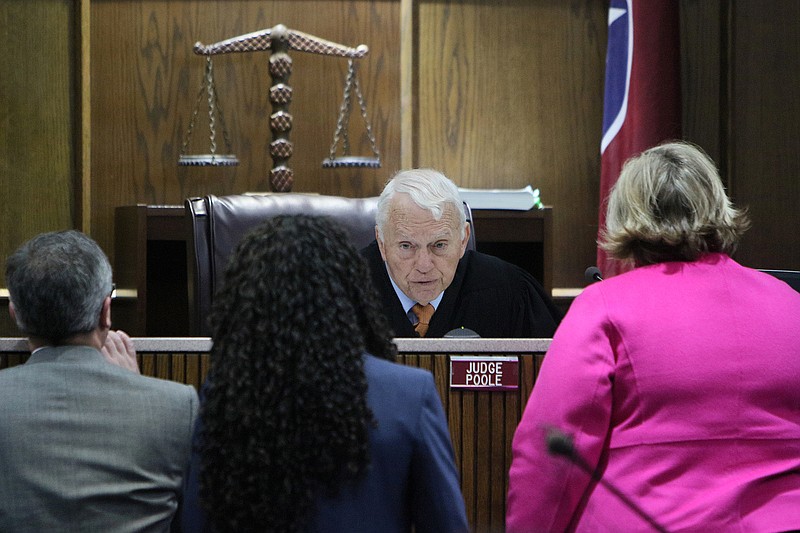After two months, courts in Hamilton County are starting to ease their restrictions on in-person proceedings, some more so than others and at different paces. But accommodations for public access still are either nonexistent or limiting in most courtrooms.
Since March 13, most in-person court proceedings - for criminal, civil and juvenile courts - have been put on hold after the Tennessee Supreme Court declared a state of emergency for the state's judicial branch in response to the COVID-19 pandemic, making it difficult for the public to view proceedings. Similar scenarios have played out across the country.
In Tennessee, the state's highest court has since asked each judicial district to submit a plan for how its respective courts plan to gradually re-open.
Overall, most of Hamilton County's larger courts - criminal, general sessions (civil and criminal divisions), circuit and chancery - are continuing to emphasize a preference for remote proceedings.
Social distancing guidelines and a plan for regular disinfecting are included in each plan, and each court is encouraging the use of protective gear, but not all are requiring it.
The courts are also limiting the number of people allowed into buildings, leaving the public without access to view proceedings. And with the exception of two courts - criminal and general sessions - none address the media.
"There are other people from the public who want to view [proceedings], you know, maybe friends and family of a defendant," said Deborah Fisher, executive director for Tennessee's Coalition for Open Government. "There can be all kinds of reasons that people might want to view it."
In a recent review of 26 judicial plans, the coalition noted that most of the plans offer no guidance on how their courts will operate transparently and openly going forward, even with more remote hearings taking place.
"I think it would be unrealistic to think that every single courthouse in Tennessee could livestream proceedings," Fisher said, noting that some may not have the resources to acquire the necessary technology.
But, she said, "I think that there does need to be some thought given to 'how do we accommodate members of the public in the media when we're either doing video conferencing for proceedings or we're limiting in-person proceedings because this could go on for quite a while."
In Hamilton County, only the criminal court has specified plans to livestream proceedings, though only one of the court's three judges has set up an easily accessible portal for the public to tap into livestreamed hearings: Judge Tom Greenholtz.
REOPENING
For Hamilton County's criminal court, in-person hearings will largely remain prohibited except for some cases in which an in-person hearing is necessary to resolve issues that involve presenting evidence.
Beginning Monday, May 18, more evidentiary hearings will be taking place.
Also starting Monday, General Sessions Criminal Division will operate three courtrooms and two dockets - one in the morning and one in the afternoon. The court will hear cases involving 60 defendants per day in each courtroom, though only 10 people, excluding court personnel, will be allowed inside the courtroom. All other people will be asked to wait outside in the lobby and to sit 6 feet apart.
In General Sessions Civil Division, 10 motion hearings or case settings will be held per hour between 9 and 11 a.m. and again at 1 p.m. each day except for Thursday, during which proceedings will be limited to just five cases per hour. Bench trials are not expected to begin until June 3.
If there is a sustained decline in COVID-19 cases within the county, more court cases will gradually be added to each docket in both civil and criminal divisions beginning June 3.
Juvenile court is only holding in-person hearings "as a last resort after reasonable consideration of alternatives including and up to" rescheduling to a later date.
(READ MORE: COVID-19 impact on criminal court dockets across region expected to be 'a significant problem')
Chancery and circuit courts are emphasizing a preference for remote communication and are seemingly more lenient than other courts about when to hold in-person hearings.
Uncontested trials, such as agreed-upon divorces, and defaults may be held via phone or video conference unless the parties don't have legal representation. Adoption cases can be heard either remotely or in person.
In other cases, the courts have asked litigants to, when filing motions, answer some logistical questions, such as how long an argument may take and, if requesting an in-person hearing, explain its necessity.
A scheduling conference is then held ahead of each hearing, at which time the judge will determine how to hold the hearing.
The smaller municipal courts (including Collegedale, Chattanooga, East Ridge, Lookout Mountain, Red Bank, Soddy-Daisy and Signal Mountain) vary widely to what extent they will open.
Collegedale Municipal Court will limit the number of people allowed in the courthouse and will fully resume in-person proceedings with social distancing accommodations. Chattanooga City Court will do the same but is initially limiting its docket size.
Other municipal courts, including East Ridge, Red Bank, Soddy-Daisy, and Signal Mountain, are not resuming in-person hearings until June, though some exceptions are being made when a criminal defendant is in custody.
Lookout Mountain's court didn't specify a date at which it plans to resume in-person hearings, but stated that telephone and video conferencing is preferred over in-person proceedings and that it will "conduct as much business as possible" that way.
Contact Rosana Hughes at rhughes@timesfreepress.com.
